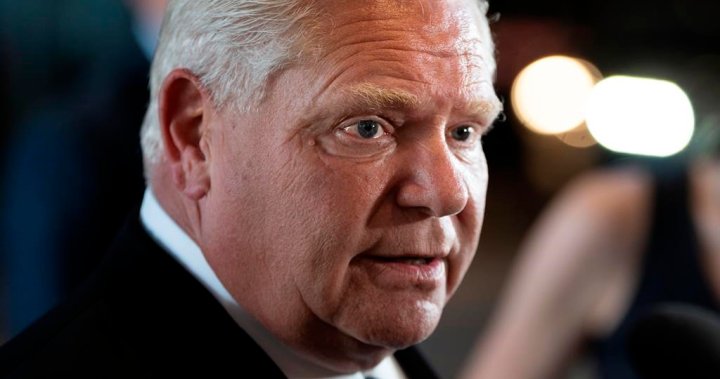Ontario Premier Doug Ford advocates for a collaborative approach between Canada and the United States in addressing the perceived economic threat posed by China, urging a united front rather than resorting to detrimental trade disputes. He further extends this call for collaboration to Mexico, emphasizing the need for a trilateral North American alliance against what he sees as unfair Chinese trade practices. His central argument rests on the premise that a trade war between Canada and the U.S. would only benefit China, weakening both North American economies while empowering their shared competitor. Ford’s strategy involves direct engagement with U.S. media outlets, aiming to persuade the American public and policymakers of the mutual benefits of maintaining strong trade ties.
Ford’s primary concern centers around China’s alleged exploitation of Mexico as a conduit for its goods into the North American market. He accuses China of circumventing the rules of origin stipulations within the Canada-United States-Mexico Agreement (CUSMA) by labeling Chinese-made products as “Made in Mexico,” thereby gaining access to the U.S. and Canadian markets while undercutting North American industries and jobs. This practice, according to Ford, necessitates a clear stance from Mexico: either align with the North American trade bloc’s interests or risk jeopardizing its privileged trading relationship with its neighbors.
To counteract the perceived threat from China, Ford proposes a united front between Canada, the U.S., and Mexico. He argues that a trade war, particularly between Canada and the U.S., would be counterproductive, ultimately benefiting China by weakening both economies and strengthening its position in the global market. Instead, he suggests that a collaborative approach, focusing on strengthening North American manufacturing and trade, would be a more effective strategy to counter China’s growing economic influence. He emphasizes the deeply integrated supply chains between the three countries and the benefits of leveraging their collective economic strength.
Ford’s strategy involves proactive engagement with U.S. media and policymakers, aiming to directly address concerns and misconceptions about Canada’s trade practices. He has embarked on a media tour, appearing on major U.S. networks such as CNN, Fox News, and CNBC, articulating his position and emphasizing the interconnectedness of the Canadian and U.S. economies. He argues that tariffs on Canadian goods, particularly energy exports, would negatively impact both countries, leading to increased prices for American consumers and economic hardship for Canadian producers.
The Premier’s message aligns with similar concerns raised by other Canadian officials, including Prime Minister Justin Trudeau, who has acknowledged shared concerns about Chinese investments in Mexico. This concern has also been echoed by the U.S. Biden administration, highlighting a converging perspective within North America regarding China’s economic strategies. The potential repercussions for Mexico, should it fail to address these concerns, have been alluded to by both Trudeau and Ford, suggesting potential revisions to existing trade agreements if the issue remains unresolved.
Ford’s proactive engagement underscores the importance of maintaining strong Canada-U.S. relations, even in the face of potential trade disputes. His direct appeals to the American public and his emphasis on shared economic interests reflect a strategic approach to navigating the complexities of international trade and geopolitical competition. By framing the issue as a shared challenge, he seeks to foster cooperation and prevent a trade war that he believes would ultimately benefit China at the expense of both Canada and the United States. This approach, coupled with direct engagement with U.S. officials, demonstrates a proactive strategy aimed at protecting Canadian interests while promoting a unified North American economic front.

